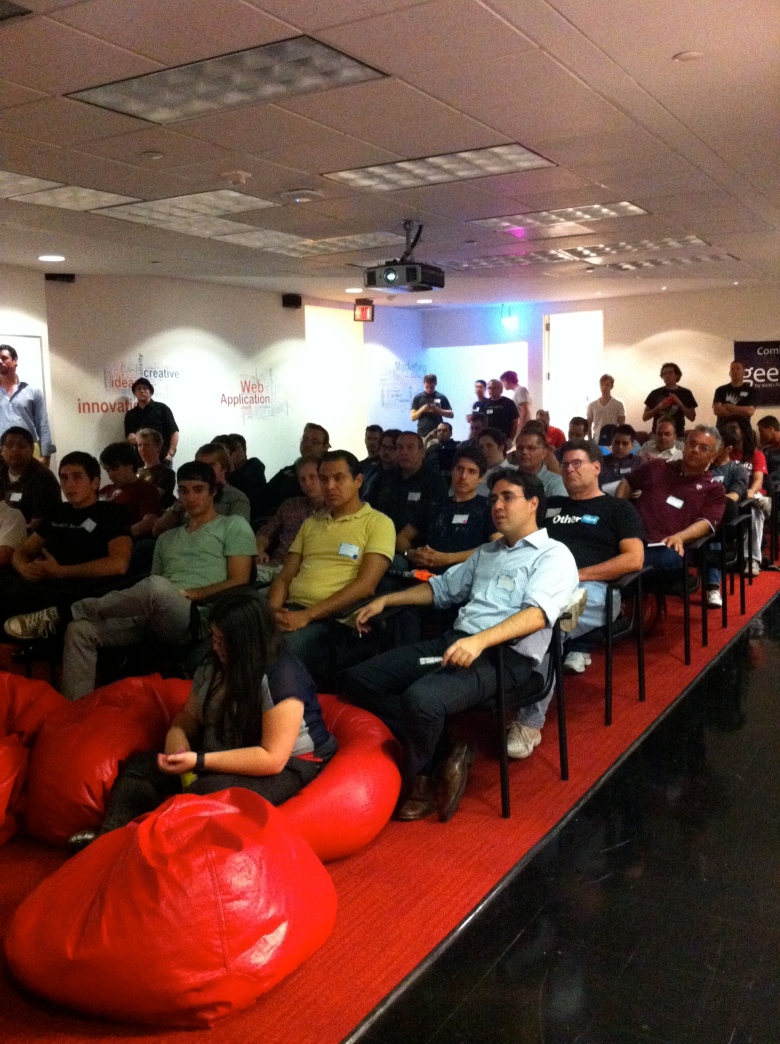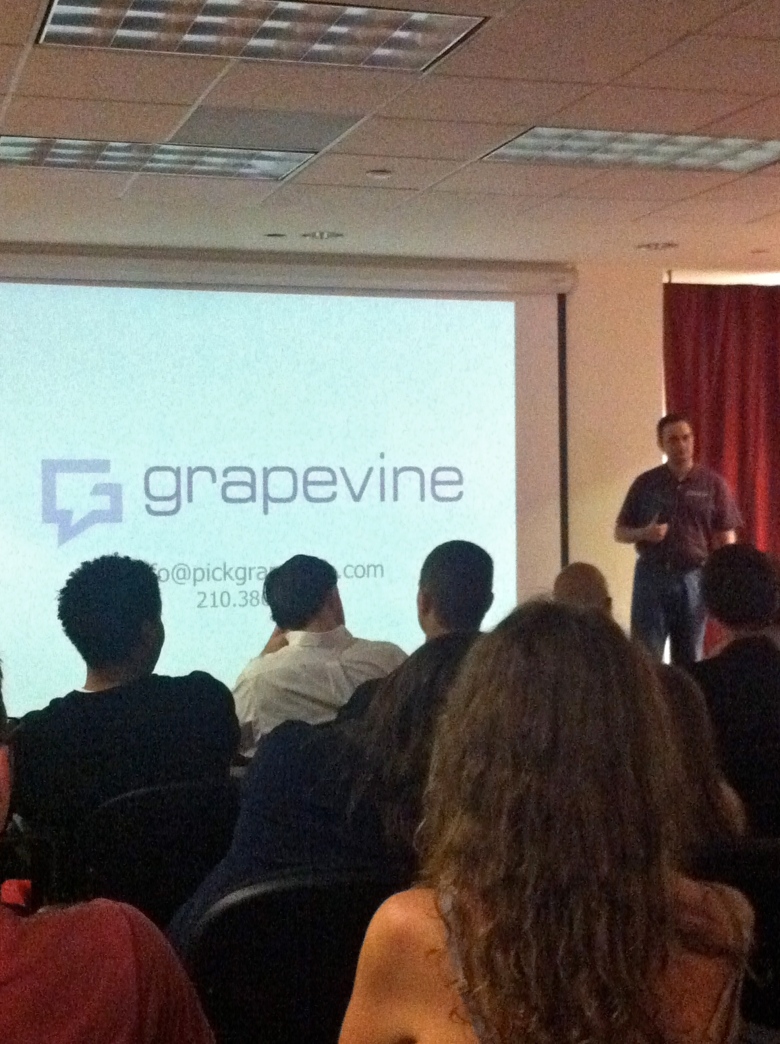
While the Fiesta Flambeau Parade illuminated the city on Saturday night, a group of innovators, entrepreneurs, and other geeks sent their own creative sparks flying this weekend at Weston Centre. San Antonio’s fourth 3 Day Startup event took place high up on the eleventh floor at the collaborative workspace known as Geekdom. During a brain-churning 72-hours, ideas ignited, partnerships were forged, and corporations were born in a blaze of entrepreneurial activity.
The lack of neuron-stimulating jobs in San Antonio, mentioned in Callie Enlow’s recent piece, as well as the exodus of homegrown intellectuals and college graduates (not-so lovingly referred to as “brain drain”) are two topics garnering significant attention in the ongoing discussion about San Antonio’s present and future. A groundbreaking collaboration between Trinity University, Rackspace, Geekdom, TechStars, and Trinity alumnus David Morris seeks to confront those challenges with 3 Day Startup, a hands-on entrepreneurship education program in which participants start a tech company in three days. I sat down with two major forces behind the San Antonio 3DS program, Trinity University Director of the Center for Entrepreneurship and Innovation, Luz Cristal Glangchai, and Rackspace co-founder, Pat Condon, to hear about their vision for 3DS in the Alamo City.
The program accepts applications from a diverse population of students and professionals in San Antonio and Central Texas. From some 200 applicants for this particular incarnation of 3 Day Startup, 40 were selected to participate in the free 72-hour techstravaganza. After intense brainstorming and numerous informal pitches to the group of the products of that ideation period, participants voted on the top five most viable ideas for a tech startup.
The group self-selected into teams, each taking one of the five topics, and spent the rest of the weekend working with teammates and 3DS mentors to develop a business plan, build a prototype, engage in market research out in the city, and otherwise prepare for their formal Sunday evening pitch to a panel of investors and members of the San Antonio business community. “We say it’s just kind of a spark to get them started,” explained Glangchai, “to show them what’s possible, and after that we really want them to pursue their own idea.”
The atmosphere on Sunday night at Geekdom was electric. Andy Quirin, a Racker by day and a member of the 3DS Teachers Trade team this weekend, described his feelings throughout the 72 hours as similar to those of a child on Christmas. Others apparently shared his sentiment, evidenced by the participants’ excitement while the presentation space quickly filled to standing room only.
Despite the outrageous sleep-to-work ratio of the weekend, every one of the teams’ presentations was polished, professional, and featured a working prototype of their website or app. (I should mention that 3 Day Startup isn’t all work and no play. The long days and largely sleepless nights of strategizing, researching, and brainstorming were punctuated by the occasional Nerf gun war and participants versus mentors dodge ball game.)
This particular 3DS session heard pitches from Grapevine, Cabstr, Allergy Scan, Teachers Trade, STEMivate Academy, and Soccer Mentality. All the presentations were met with a healthy mix of roaring applause and hardball questions from investors: Is there a big enough market for this? Why hasn’t someone done this before? Is the problem you’re addressing significant enough to merit a solution? How difficult is your model to imitate? Why aren’t you charging for your app? Do you have a defensible strategic position for this venture?
Such probing questions as these from investors, coupled with the productive-but-critical feedback from mentors, helped teams to maximize their time and streamline their work at Geekdom. Trinity senior Purushottam Shah worked on the STEMivate team with Mark Barnett, agreeing that “the best part was definitely getting feedback from the mentors… and also, meeting people who are motivated to do something and change the way things work.” The team officially launches their company today and is working to introduce a pilot program to a San Antonio area school.
Many 3DS alumni were also present at the final pitch, including Trinity junior Chase Bartlett who participated in San Antonio’s first 3 Day Startup. His company, RhinoLaunch plans to incorporate and launch sometime this summer. Some others I spoke with have discontinued their 3DS projects, but have stayed involved with Geekdom, maintain ties with mentors and fellow program participants, and expect to pursue other tech startup ventures in the future.
Condon, who first observed 3DS at UT Austin, likens the program to an entrepreneurship lab class: “If you take a chemistry class in high school or college, you go to a lecture and you read a book and the teacher talks the whole time, and then there’s a lab component of that class where there are Bunsen burners and beakers and you’re mixing stuff.” That situation, he proposes, is analogous to learning about entrepreneurship in a classroom, and then jumping in and actually launching a business. “It’s where you actually dig in, you figure out what it is to start something, to create something from nothing.”
In comparison to accelerators like TechStars or 500 Startups, 3DS might be best described as a pre-accelerator. Glangchai said that many of the participants, especially students, don’t come from business backgrounds. At the end of the three days, however, a religion major or an art history major will have worked with a computer scientist or businessperson to successfully deliver a business plan. “It’s showing them that it’s possible to actually create a company, that they could do it, and sparking them to continue on further, where they could actually then go into [an accelerator like] TechStars.”
Condon agreed, noting that “TechStars is three months and this is three days,” and also estimating that one of the five groups participating in a typical 3DS will go on to launch as a real company. But even those that don’t make it will benefit from the opportunity to network with investors, mentors, and future business partners.

Speaking of networking, here’s a question: Would increased business contacts in San Antonio help ameliorate some of the brain drain mentioned earlier and encourage bright young entrepreneurs like the 3DS participants to remain in our city?
Glangchai hopes so, pointing to the leadership of Rackspace and Geekdom in building technical and entrepreneurial communities. “I kind of see it as a whole pipeline,” Glangchai said. “You start with the students, you get them really excited, you show them what the mentors are doing here, and what the business leaders are doing here, and you create the network for them so they’re going to, hopefully, want to stay here, get investment here, they’re going to start companies here, they’re going to come work at Geekdom. I see it as a whole cascading effect.”
Condon elaborated on Glangchai’s pipeline hypothesis, naming the Bay Area as a classic example of business connections helping to retain the intellectual capital of a city’s collegiate population. “You have four or five really good universities that are tightly integrated with the business community, and it creates a pipeline for smart people to come out, to stay, to start companies that get funded, that create jobs, that build up the whole region.”
Condon cited the Kauffman Foundation’s findings that net job growth occurs in the U.S. economy only through startup firms. The Foundation’s July 2010 study revealed that “both on average and for all but seven years between 1977 and 2005, existing firms are net job destroyers, losing 1 million jobs net combined per year.
By contrast, in their first year, new firms add an average of 3 million jobs.” He continued in the same vein: “We need more people creating little companies. Not everything is going to get to be the size of AT&T or Rackspace, but we need people creating little companies. People don’t even know that that’s a possible path. And so I think 3 Day Startup just opens people’s eyes to go, “Oh my gosh, I could do this. This isn’t magic, it’s not rocket science; it’s very doable.” After seeing the incredible ideas developed and delivered by this crop of 3DS participants in a mere 72 hours, I would have to agree.
While the 3 Day Startup weekend and all that was accomplished still seems a little bit magical, starting a tech company from the ground up just became a whole lot more doable to 3 Day Startup participants and bystanders like me, and THAT is something worth writing about.
Miriam Sitz works for Accion Texas Inc., the nation’s largest non-profit microlender. A graduate of Trinity University, she blogs on Miriam210.com and sells handmade goods on TinderboxGoods.com. Follow her on Twitter at @miriamsitz. [Click here for more stories from Miriam Sitz on the Rivard Report.]
(Full disclosure: The Arsenal Group has performed consulting services for Trinity University, but does not publish sponsored stories.)
Related Stories:
From Inside the Machine: Day One to Demo Day with TechStars Cloud 2013
UPDATED: Finding Stars in the Cloud at TechStars Demo Day 2013
The Randomists: Inventors, Robot Engineers, Seventh Graders
Rackspace Hosts the “Hackers, Hipsters and Hustlers” of StartUpBus
Reimagining the MBA: St. Mary’s University, 3 Day Startup, and Social Entrepreneurship
Open Cloud Academy Open For Business: Bridging IT Employment Gap
Geekdom: One Year Old and Best in Texas
The Key to Continued Brain Gain: Specialized Higher Education





Yes, Miriam, it is indeed worth writing about. As a member of STEMivate and veteran of numerous startups (although this was my first real exposure to 3DS) I must agree with Luz Cristal Glangchai of Trinity and Rackspace co-founder, Pat Condon: startups, early stage companies and “small” businesses in general create more jobs than large businesses and do help fight “brain drain;”
Great coverage, great story telling. I was there over the weekend and absolutely blown away by the creativity and instant teamwork. Random strangers meeting in a room, setting their egos aside and just getting things done. What I saw done in 3 days often takes 3 months of meetings, planning, committees, and political turf battles in many businesses. Kudos to the entrepreneurs. Long may you disrupt, innovate and prosper.
Sadly, I have not had the time to make it to any one of the 3DS events since the last one held at Rackspace. I am a fan of the 3DS and Geekdom however I hate to say that this all inclusive partnership between Geekdom, Trinity and Rackspace is powering startup activity from mostly within that same circle. Well, I have noticed that most of the activity that takes place is usually with workers from Rackspace and students from Trinity. Some of the people come from outside that circle sure but it’s not enough. The Trinity Bubble needs to pop!
Excited that Orlando Segura Jr of Locivate (locivate.com) will be there this weekend!!
Me two! I’m hoping to be able to stop by with some friends from out of town. –Iris
Kirpeep.com will be there! Super excited!